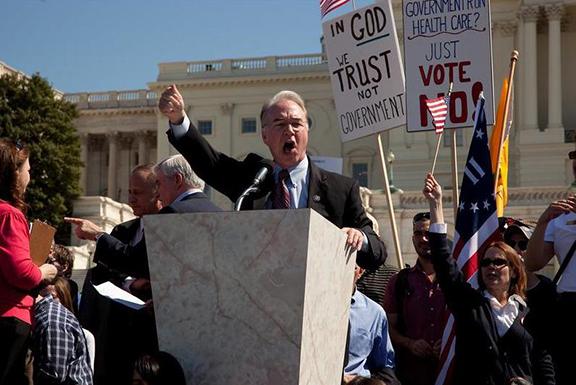It’s springtime, and in this city, in our neighborhoods, we could be living almost anywhere, with slight differences of details because we lead daily lives as prosaic as a suburbanite filling his SUV with soccer gear. You can close your eyes and the world is not that much with you, breathing down your neck with alarming tales of celebrity or war.
But in Washington, that’s hardly ever true. In the most beautiful weekend of the year so far, the SunTrust National Marathon, thousands strong, came through our neighborhood and others, the water bearers lined up along Columbia Road as the early batch, loped through. It transformed, if not transfixed, where we lived — streets closed off, drivers grinding through the maze of Lanier Place, Ontario Road or Adams Mill Road, trying to get out to the grocery stores.
“My daughter’s in this,” a neighbor said, rushing to get to the race. “Gotta get out there.”
Elsewhere, at Lafayette Park, thousands of anti-war(s) protesters gathered, protesting not only the U.S. presence in Afghanistan and Iraq, but Israel’s settlements. As of old, they brought masks, megaphones, coffins, the regalia and passion of the young.
They may have picked the wrong time to gather this way in front of the White House or in the city. For one thing, there was the spring fever burning bright, infectious. For another, the transient politician among us, and the occupants of the White House were pre-occupied with other things.
This was the weekend, when, in contradictory fashion, the big health care reform bill, almost in a flash, spurred by encouraging CBO statistics about its cost and by the impassioned pleadings of the president himself, suddenly was about to come to a vote.
Which meant, of course, that the Tea Party folks were in town. This may have meant little to people in Georgetown, or in my neck of the woods off Rock Creek Park in Adams Morgan, but they made their presence felt on Capitol Hill.
On the Hill, history and history-making kissed us squarely on the mouth. It was pure theater, mixed in with the regular theater, the president giving one of his classic campaign style speeches — “Don’t do it for me, don’t do it for the Democratic Party, do it for the American people” — while the GOP stalwarts, including the sour-faced House minority leader Jim Boehner, repeated his mantra: the American people don’t want this bill. Outside, the Tea party folks accused Democrats of socialism, communism, big-ism, take-over-ism, and so on, with a fury rarely seen in this city since the last Cowboys-Redskins game at RFK stadium.
Some members of the Tea Party, it should be noted, also exposed themselves, not in the usual way, but with racial and homophobic slurs directed against black and gay Democrat legislators on Saturday and again on Sunday. Mr. Boehner, when pressed, called this reprehensible, although somehow managed to say it in a way that suggested the American people were so angry about health care that they forgot themselves.
What was certain was that if the GOP party itself had previously tried to keep a thin distance between itself and the Tea Party, it disappeared entirely on Sunday. Faced with a vote that would pass a historic bill they had fought so bitterly, GOP legislators moved out to a balcony and egged the crowd on with “Kill the Bill” signs.
Eventually, history was made: the bill, by a 219-212 margin, had passed.
We were asleep by then. Many of us had also missed the sunny Sunday afternoon on the mall where still another group in the thousands had gathered to ask for immigration justice.
The very fact that history looms over our shoulders daily in this city is what makes the things we do from day to day so precious here, because we hear the hollering of the Tea Party, the banging of the drums of the protesters, the epic words of political opposites. We have our own little political struggles to overcome: the murmurs of discontent about our mayor pop up in the neighborhoods, there and there. Overnight, history sweeps through our sleep, through our locked doors.
We wake up, like everyone else and pick up the morning paper on the third day of spring, awaiting rain.


